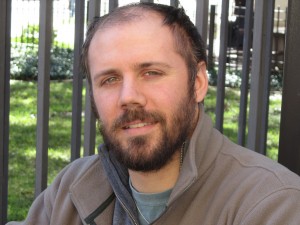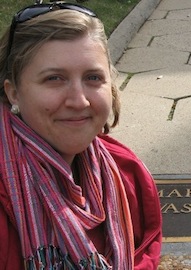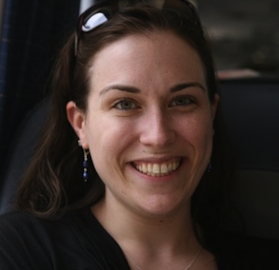Our 2012 Recruiting events at the Scholtz Garten, the plush SAC Conference room and our dear old Burdine were enjoyed by all. I have to say that listening to everyone talk enthusiastically about their research and our community makes me very glad to be in such good company. Please take a moment to enjoy our 2012 recruiting movie. Hope to see many of you in Fall 2012!
Category Archives: Austin
Texas: It Ain’t All Howdys and Y’alls by Chelsea Smith

When I announced to my friends that I would be moving to Texas, I received a lot of skeptical responses, ranging from confusion (“why would you want to do that?”) to hyperbole (“you’re going to get shot”). Like many people considering a move to Texas for the sake of their education, I was well aware of the stereotype of all Texans as socially conservative, gun-toting cowboys and Southern belles. After living in Texas for five and a half years (in Houston for undergrad and then some, and now in Austin), I’ve learned that there’s much more to Texas than these stereotypes. Here are a few lessons I have learned that I would like to share as you decide if UT-Austin and Texas are the right place for you.
1. Texas, and Texans, are a lot more open-minded than expected. Given its bad reputation, I expect people would be surprised to hear of the progressive changes that have come out of Texas. In terms of LGBT rights, Houston elected Mayor Annise Parker in 2009 (and re-elected her in 2011), making her one of the first openly gay mayors of a major U.S. city. Additionally, Civil Rights leader Barbara Jordan was the first African-American woman elected to the Texas Senate in 1966 and the first woman elected as a federal House Representative of Texas in 1972. Located next to UT’s Texas Union building, a statue of Representative Jordan commemorates her political advocacy for the disadvantaged. Finally, southern comfort is more than a liquor that came out of our neighboring Louisiana. In general, Texas is known for its southern hospitality, and the large university base in Austin lends an even greater feeling of friendliness to the city.
2. Culture is culture is culture. The stereotype of Texan culture as the howdy’in cowboys and belles I mentioned earlier both reduces and ignores the diversity of cultures and people in Texas. The proximity to Mexico means a strong Mexican cultural presence, which has also branched off into a distinct Tex-Mex (or Mex-Tex, if you like) culture. Beyond breakfast tacos on restaurant menus and mariachi bands at weddings, Texas is at the forefront of immigration trends and shifts in the racial and ethnic makeup of the population that will soon come to influence the rest of the United States. Whether a research interest of yours or not, these trends have important implications for public policy and social relations that we are already experiencing in Texas and that foreshadow similar issues on the national scene. Furthermore, Austin has numerous subcultures and creative venues, evident in the annual South by Southwest festival, popular food trucks, and bicycle gangs.
3. There are “crazies” everywhere. One of my biggest concerns about moving to (and deciding to stay in) Texas were political extremists, by which I mean those who try to impose their political and social views on others to the detriment of public discourse. Regardless of your political inclination, extremism in either direction tends to be pretty scary – but these kinds of people exist everywhere, from Texas to Missouri to New York City. While their concentration may shift, you will never escape such people; and if your goal is to surround yourself with people whose views are exactly the same as yours, good luck navigating academia or any other profession.
4. You can’t beat the weather (except in the summer). Saving the most superficial for last, near year-round warm weather and sunshine can do wonders for your life. As I write this blog post, I am sitting on the patio of a cafe overlooking sunshine reflecting off the lake. I may also be studying for a midterm exam, but I am doing so in beautiful 75˚ weather – in the first week of March! For me personally, I am much happier and much more productive when I can be outside, and this is not a trivial factor in my quality of life. If running trails, bike rides, and kayaking year-round are your thing, you’re in luck. If admiring the December sunshine from your apartment window is your thing, you’re in luck.
To conclude what has almost become a public service announcement or love letter of sorts to Texas, I concede that there are disadvantages to living in Texas. The state legislature has passed recent laws to which I am very morally opposed and the traffic on I-35 is always atrocious. However, the advantages I have experienced as a Texas resident and as a member of UT’s nationally competitive sociology program are greater. When I first moved to Texas, I made a promise to myself to boycott cowboy hats and usage of the word y’all. Over time, I have confronted and moved past my own stereotypes and misconceptions of a state it turns out I knew little about. Y’all has slipped into my vocabulary. Although, a cowboy hat has yet to touch my head in any kind of seriousness.
—
Chelsea Smith is pursuing her doctoral degree in the Department of Sociology. Her research interests are in family sociology and demography. After graduating from Rice University in 2010, she worked on a longitudinal, mixed-methods study to examine gender differences in the graduate student experience, with a focus on STEM fields, gender, and fertility intentions. As a PhD student at the University of Texas, Chelsea plans on studying non-traditional families and relationships between parents and children.
Research Questions with graduate student Amy Lodge
Research Questions (RQ) is Q&A series profiling the faculty, graduate students, and alumni of the Sociology Department at the University of Texas at Austin. In brief conversations, this series looks at the diverse projects, interests, and sources of inspiration within the UT-Austin sociology community.
This week we take a look at the research of graduate student Amy Lodge, 2012 winner of the Norval Glenn Prize. The Sociology Department established the Norval Glenn Prize in 2011 to celebrate the memory of our esteemed colleague by giving an annual award to the best graduate student paper in the sociology of the family.
Research Questions (RQ): Amy, what brought you to the field of sociology?
Amy Lodge: I was (and am) drawn to the field of sociology because of the unique power of sociology to change the way we see the world. Living in an individualistic society, few of us are encouraged to see how our lives and the lives of others are shaped by broader structures and systems of meaning. Examining the world from a sociological perspective can be scary at first as we often have to re-examine our taken for granted understandings of the social world, but is ultimately an exciting and life-long learning experience.
RQ: Congratulations on winning the 2012 Norval Glenn Prize! Do you have any other exciting news you’d like to share?
AL: Thanks! I am excited to begin analyzing the data for my dissertation. Based on in-depth interviews, my dissertation will examine the processes and meanings through which social ties shape physical activity and how those processes differ for men and women, African Americans and whites, and over the life course. At the Annual American Sociological Association meeting in August, I will present preliminary results from my dissertation which focus particularly on how parenthood shapes physical activity differently over the life course and how that differs at the intersection of race and gender.
I am also excited about a forthcoming article appearing in Journal of Marriage and Family that I co-authored with my advisor Dr. Debra Umberson. It examines how mid and later life married couples experience changes in their sex lives and how those experiences are shaped by the intersection of gender and age.
—-
Amy Lodge is a doctoral student in the Department of Sociology. She earned her MA in Sociology (2008) from the University of Texas and her BA in Sociology (2006) from the University of South Carolina. She is interested in gender and sexuality, aging and the life course, family relationships, race/ethnicity, and physical activity. She currently teaches Gender, Race, and Class in American society and has previously taught Sex and Violence in Pop Culture in the Department of Sociology.
Our Austin Valentine from us to us to you
It’s no secret that Austinites love to talk about our town. So here’s our Valentine from us to us to you. Have a happy Valentine’s Day!

Research Questions with graduate students Pamela Neumann and Kate Henley Averett
Research Questions (RQ) is Q&A series profiling the faculty, graduate students, and alumni of the Sociology Department at the University of Texas at Austin. In brief conversations, this series looks at the diverse projects, interests, and sources of inspiration within the UT-Austin sociology community.
This week we check out the exciting projects of graduate students Pamela Neumann and Kate Henley Averett.
 Research Questions (RQ): Pamela, what brought you to the field of sociology?
Research Questions (RQ): Pamela, what brought you to the field of sociology?
Pamela Neumann: I’ve always been interested in social inequalities, but during undergrad I approached these problems mostly through the study of electoral politics and state institutions. Post-college, I had several formative experiences working for non-governmental organizations–first in San Antonio and later in Nicaragua–which ultimately led me back to graduate school, initially to UT’s Latin American Studies program. When I began my graduate work, I was fairly certain that I would eventually return to the development world, but that all changed after doing fieldwork in Nicaragua for my thesis. I realized that I had a passion for doing ethnographic research, and writing about the daily lives and struggles of women–so, with the encouragement of a couple faculty mentors in UT’s sociology department, I decided to dive in. And I’m so glad I did.
RQ: What’s your favorite thing to do in Austin?
PN: It’s hard to pick just one! Certainly the many warm and sunny days year round make it easy to spend a lot of time outdoors running or hiking. I also have a serious breakfast taco addiction, and there are more than a few great places to grab those around here.
RQ: What brought you to the field of sociology?
Kate Henley Averett: I took a somewhat winding road to get to sociology. When I began my MDiv program at Harvard in 2005, I was really interested in working with teens and young adults around issues of sexuality and spirituality, and was especially concerned about young queer people experiencing religious-based bullying due to their sexuality and/or gender expression. I grew frustrated during my program that I wasn’t able to find enough research about these issues to inform my career path, which was my first clue that maybe a research-based academic career was the logical next step for me. I spent a couple of years after finishing my masters doing a lot of reading and soul-searching, and when I realized that most of what I was reading were books written by sociologists, I decided to start researching sociology graduate programs.
RQ: Kate, do you have any exciting news in the works?
KHA: I’m currently working on a study that I’m really excited about, interviewing LGBTQ parents of young children about their parenting philosophies and experiences with a specific eye toward thinking through the intersections of gender expression, heteronormativity, and parental expectations in shaping the gendered lives of children. I’m doing a conference course this semester with my faculty mentor, Dr. Christine Williams, to work on preparing a paper for journal submission out of these interviews. Not only am I getting great on-the-ground research experience, I’m also getting tons of ideas for dissertation topics.
—-
Pamela Neumann is a PhD student in the Department of Sociology at UT-Austin. She earned her MA in Latin American Studies from UT-Austin and her BA in Politcal Science from Trinity University (San Antonio). Her master’s thesis focused on the trajectory and effects of women’s participation in community development in rural Nicaragua. She was particularly interested in how women’s involvement in the public sphere affected their own daily routines and household dynamics. Her broad areas of interest are gender, political sociology, poverty and development, and collective action, with a regional focus on Latin America.
Kate Henley Averett is a second year doctoral student studying gender, sexuality, and childhood. Originally from the Boston area, Kate has a BA in Religion from Mount Holyoke College and an MDiv from Harvard University.
February events showcase student and faculty research
Our Sociology Brownbag series is underway with three events this week and next. Also scheduled: February 24th Power History and Society presents: Dr. Sheldon Ekland-Olson talking about his new book “Who Lives, Who Dies, Who Decides?”
And who can resist a Leap Day (February 29th) taco brunch with Amias Maldonado and Nicholas Reith who present the ins and outs of “Social Networking, both Virtual and In Person”?
March blows in the always exciting and much celebrated 2012 recruiting events, March 21-22, introducing us to our prospective colleagues. Who will join our 2012 cohort?
Friday afternoon at UT Austin and Spider house
A day in the life – UT Austin 1-27-12 graduate students and faculty
Rave reviews for “Who Lives, Who Dies, Who Decides?”
Early reviews for Dr. Sheldon Ekland-Olson’s new book: “Who Lives, Who Dies, Who Decides?” are in and are effusive in their praise for this important study of issues surrounding Life and Death. Abortion, assisted suicide, capital punishment and others are among the most contentious in many societies. Whose rights are protected? How do these rights and protections change over time and who makes those decisions? Based on the author’s award-winning and hugely popular undergraduate courses at the University of Texas, the book explores these questions and the fundamentally sociological processes which underlie the quest for morality and justice in human societies. Dr. Ekland-Olson’s goal is not to advocate any particular moral “high ground” but to shed light on the social movements and social processes which are at the root of these seemingly personal moral questions.
One Amazon.com reviewer calls it a “tour de force, one of the most interesting and thought provoking books he has ever read.” Another was brought to tears by the story of one father’s struggle with the decision to allow his 7 year old child to die. All mention the meticulous breadth and depth of the research, the non-judgmental tone and accessibility of the material. While Sheldon is a teacher’s teacher, his friends and colleagues know that despite his many titles and awards, he remains a happy mortal among men, inspiring not just respect but our profound appreciation.
Dr. Sheldon Ekland-Olson is the Audre and Bernard Centennial Professor at The University of Texas at Austin, where he served as the Dean of the College of Liberal Arts and Executive Vice President and Provost. He is the winner of numerous teaching awards, and one of his classes was listed among the 2009 10 Hottest Courses in the Nation. His previous publications include The Rope, The Chair and the Needle, Texas Prisons, and Justice Under Pressure.
Race and Ethnicity Research Cluster, Fall 2011
Maggie Tate on Race and Ethnicity presentations by Lady Adjepong and Kate Averett
On Friday, December 2nd, the Sociology department’s Race and Ethnicity research cluster met for the final discussion of the semester. Lady Adjepong, a first year student and Kate Averett, in her second year, presented papers in progress as part of the group’s goal to create a space where students can work through theoretical ideas about race and how race intersects with gender, sexuality, and class. Lady Adjepong’s paper, “Black Female Masculinities,” grappled with the way black women who perform masculinity fit into discourses of gender and gender non-conformity. Adjepong is critical of previous research on female masculinities that describes a return to masculinity as male bodied. Because cultural stereotypes already align black women as closer to masculinity and thus further from femininity than white women, discussions of black female masculinity tend to reify traditional norms regarding racialized notions of beauty and gender.
Kate Averett’s paper, “The Anxious Public: Disruptive Bodies, Troubled Spaces, and Anxious Response,” discussed the anxious public response that followed Bobby Montoya’s wish to join the Girl Scouts of Colorado. Bobby, a seven year old whose assigned sex was boy but who identifies socially as a girl, was denied entry into the Girl Scout program in the fall of 2011 because he “had boy parts.” Averett analyzed news websites that reported the story, as well as the comments that were posted in response to the news reports and found a pattern of sensationalism in the reporting and gender anxiety on the side of the public. Averett argued that because spaces coincide with a somatic norm, when bodies that don’t fit that norm attempt to inhabit those spaces, the response is characterized by anxiety and terror. The co-construction of bodies and spaces maintains the masculinity/femininity binary, and disruptions to the boundary threaten to destabilize the identities of individuals. But more than this, Averett argues, the Girl Scouts’ historical role in shoring up American values means that the separation of the sexes/genders is part of the construction of a national identity. Thus, individual gender anxieties become national gender anxieties. Questions for further discussion to Adjepong’s paper include how we can theorize gender presentations without returning to traits or characteristics embedded in the body, and how Sojourner Truth’s “Ain’t I a Woman” speech might inform contemporary discussions of the intersection of race and gender. Questions for further discussion to Averett’s paper include to what extent “strange” bodies in spaces are required to construct somatic norms, how much anxiety around identity and Girl Scouts is a future oriented fear, and how Bobby Montoya’s racial identity contributes to the anxiety her presence produces.
Happy Holidays from UT Austin Sociology
It’s always a pleasure to enjoy kicking off the holidays at the historic Littlefield Home. As we bring the semester to a close, celebrating our community of friends and colleagues, it’s good to take time to refresh and look forward to a new semester of challenges and good cheer. View a movie of our: 2012 Holiday Party. Season’s Greetings to one and all from the Sociology Department at the University of Texas at Austin.


